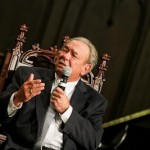 Question: Is it really a Scriptural practice for churches to have just one guy up front preaching to the congregation week after week?
Question: Is it really a Scriptural practice for churches to have just one guy up front preaching to the congregation week after week?
Thanks for your question. So much needs to be said in order to give an adequate answer. In fact, I would say that an entire book would be needed to do the subject justice. That is because before addressing your specific question, much foundational background material needs to be covered. We would first need to talk about Biblical eldership, its role and function in the Body of Christ, as well as elder qualifications. However, let me at least make a brief attempt to answer your question. Two points quickly:
(1) I believe the New Testament teaches male eldership. This is in no way meant to discount the ministry of women. Women have a huge and vital role to play in the ministry of the Church. That needs to be emphasized and underscored many times over.
Women are uniquely gifted and are totally equal to men in worth, value and dignity. When I speak of any kind of restriction, I speak only of eldership itself and its governmental role in the Church. God has every right to organize the Church as He sees fit and from my studies of Scripture, it seems clear that He has given the task of ruling in the Church to men (1 Timothy 2:12,13). (For more on this topic, I highly recommend Dr. Wayne Grudem’s book “Evangelical Feminism and Biblical Truth” which goes into this subject in great detail and provides answers to more than 100 disputed questions).
(2) I believe eldership is plural. As I read the New Testament, I dont see any local Church with merely one man fulfilling the task of eldership. There is always a plurality of elders.
That said, I am well aware of the fact that when a new Church is starting, there may not yet be more than one person who is qualified to lead as an elder. God is very gracious of course, and I believe He understands our need to be patient in this case. More than that, He actually commands us, through His Apostle, to be patient in such circumstances. Paul wrote, “lay hands suddenly on no man” (1 Timothy 5:22) “lest you share in his sins,” which is written in the context of warning against ordaining a young convert to leadership in the church. There are obvious temptations of pride for anyone in a leadership position and this is certainly the case when a new Christian is given a position of authority. Paul warns us against putting a novice or “new plant” (literally) into such an office.
A few years back (in 2005) I had the privilege of ministering in Mongolia where the Christian church is still very young. 20 years ago there were only a handful of known Christians in the entire country. Such is not the case today. Though young and immature, the Christian Church is thriving in Mongolia. However, at the Church where I was ministering, the Pastor had only been a Christian for six months. We need to realize, there just aren’t many people there who have been Christians for 5 or 10 years. Christian leadership is young in Mongolia because Christianity is young there.
Obviously, this young pastor recognized his need to learn all he could so that he might help those he was leading. He possessed a very teachable spirit and was making copious notes of all that our team was ministering while we were there. Yet even in this unusual situation, he was looking to bring other men onto the eldership team there with him, and with the help of others from outside, was training men for this purpose.
In an unusual circumstance such as this one, as well as in the case of a new Church starting, while having only one elder may be the current situation, it should be the vision and goal of each local church to see a plurality of elders in place. In other words, a local church having only one man in authority as an elder should only ever be a strictly temporary measure.
One of the requirements for eldership is to be “apt to teach” or “able to teach” (1 Timothy 3:2). An elder must have the ability to teach other people. This does not mean that each elder must be a highly gifted public speaker, but it does mean that he should be able to sit down with anyone and explain sound doctrine. He should know what he believes and why he believes it and possess the ability to communicate these things to others. He should be able to recognize and refute false doctrine and thereby protect the flock from the wolves who seek to devour the sheep. I believe this is what is meant by the phrase “able to teach.”
Continue reading

 Question: How do you interpret Paul’s qualification of “the husband of one wife” for a local church elder? (1 Timothy 3:2)
Question: How do you interpret Paul’s qualification of “the husband of one wife” for a local church elder? (1 Timothy 3:2) I think it is clear as can be, that what the issue there that Paul is addressing is polygamy. And in the Early Church in its formation, it took a while for the principle of monogamy to be firmly established within the Christian community because there were guys who had two or three or four wives (concubines) and that was opposed to biblical marriage, and if you have two wives, that’s one too many (at the same time, obviously).
I think it is clear as can be, that what the issue there that Paul is addressing is polygamy. And in the Early Church in its formation, it took a while for the principle of monogamy to be firmly established within the Christian community because there were guys who had two or three or four wives (concubines) and that was opposed to biblical marriage, and if you have two wives, that’s one too many (at the same time, obviously).